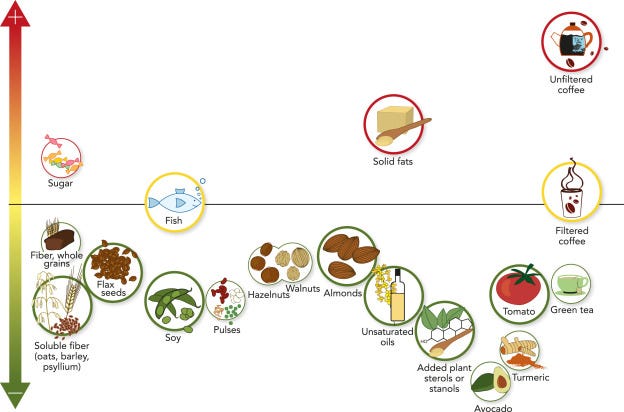Foods Impacting LDL Cholesterol Levels: The Good and the Bad
Written on
Understanding Cholesterol: A Complex Topic
Cholesterol is a lipid that plays a crucial role in our well-being. It is a vital part of cell membranes and is necessary for producing hormones, bile acids, and vitamin D. Our bodies synthesize cholesterol from dietary fats, meaning we don't necessarily need to consume foods that contain cholesterol. Typically, all animal products have some level of cholesterol, while plant-based items are cholesterol-free.
Cholesterol exists in the bloodstream bound to lipoproteins, which encapsulate cholesterol and triglycerides in a phospholipid shell, along with apolipoproteins. These lipoproteins vary in density, leading to classifications such as HDL (high-density lipoprotein) and LDL (low-density lipoprotein), among others.
HDL is often referred to as "good" cholesterol because it helps transport lipids away from cells to the liver or hormone-producing organs. In contrast, LDL, labeled as "bad" cholesterol, delivers lipids to cells throughout the body. Unfortunately, oxidized LDL can initiate plaque formation, making elevated levels of LDL a significant risk factor for cardiovascular diseases and strokes. Consequently, health guidelines generally recommend maintaining low LDL levels compared to HDL.
The Impact of Diet on Cholesterol Levels
While dietary cholesterol itself doesn’t significantly affect our cholesterol levels, the foods we consume provide the necessary building blocks for cholesterol production. Various food components, such as different types of fats and fibers, can influence cholesterol types differently.
A recent meta-analysis of systematic reviews and randomized controlled trials highlights some notable foods. Trials required a minimum intervention period of 13 days, with no caloric changes or added supplements.
The Worst Foods for LDL Cholesterol
- Unfiltered Coffee: High evidence suggests that unfiltered coffee can hinder the body's ability to break down LDL due to diterpenes present in it.
- Solid Fats: This category includes butter, lard, and trans fats, all of which negatively impact LDL levels.
- Added Sugars: Foods high in added sugars, like gummy candies, can worsen cholesterol levels, in contrast to fruits like apples.
The Best Foods for Lowering LDL Cholesterol
- Avocado: This fruit appears to be a champion in reducing LDL levels.
- Turmeric: This spice closely follows avocado in its cholesterol-lowering effects.
- Foods Rich in Soluble Fiber: Items such as oats, barley, and psyllium are highly beneficial.
Other notable mentions include tomatoes, soy products, nuts (almonds, walnuts, hazelnuts), oils rich in unsaturated fats, fiber-rich whole grains, and green tea.

While systematic reviews have their limitations, they offer valuable insights into dietary adjustments for lowering LDL cholesterol. Individual responses may vary, so monitoring your body's reactions is crucial.
Learn More About Cholesterol Management
This video titled "Dietitian Reveals 3 WORST Foods For Cholesterol" discusses dietary choices that can negatively affect cholesterol levels.
In this video, "What foods should you avoid if you have high cholesterol?" viewers will learn about dietary restrictions that can improve cholesterol health.
Bon appétit!
Thank you for reading. If you’re interested in exploring broader concepts in science, philosophy, and technology, consider subscribing to my newsletter, Thinking Ahead. It’s a free service, and I assure you, I won’t clutter your inbox.